Amole Gupte’s voice is a surge of warmth across the telephone line. “Reema..Reema..Reema,” he goes, summing up what he feels about his film’s review on this site. It is hard to sum up Gupte’s essence in a phrase, especially if it is a catchphrase. He is not this or that and he paraphrases a MS Sathyu film to say,” Kahan Kahan Se Guzre Hain, Bhai.”
How do you sum up a man who at the age of 50 directed a film that has the innocence of a child’s gaze? A man who does not even want to categorise himself as a film maker? He is not just the director who could have been credited with the direction of Taare Zameen Par. Or the maker of Stanley Ka Dabba which is steadily becoming a cult film we will always carry in our memories. There is so much more.
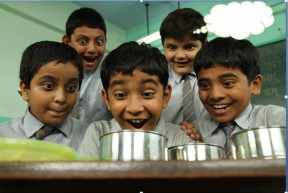 Gupte talks like a free-spirited, monsoon stream. And lives like one too. He guffaws when you remind him of the baby faced young man he was in the Doordarshan serial Palash Ke Phool and in Jo Jeeta Wohi Sikandar. He was also an integral part of more than a 100 films at FTII (Film and Television Institute of India), he reminds you where he did not go as a “careerist with a focus,” but only to be a “squatter” and to “soak in” the influences of greatness. “FTII is where Prabhat Studio once was and the spirits of all the greats still live there,” he says.
Gupte talks like a free-spirited, monsoon stream. And lives like one too. He guffaws when you remind him of the baby faced young man he was in the Doordarshan serial Palash Ke Phool and in Jo Jeeta Wohi Sikandar. He was also an integral part of more than a 100 films at FTII (Film and Television Institute of India), he reminds you where he did not go as a “careerist with a focus,” but only to be a “squatter” and to “soak in” the influences of greatness. “FTII is where Prabhat Studio once was and the spirits of all the greats still live there,” he says.
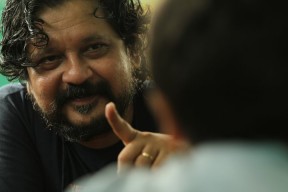 That he is a consummate actor is beyond doubt. Watch his manic brilliance in Kaminey, his self-debasing appetite in Stanley Ka Dabba, or his pivotal turn in Dayal Nihalani’s Guru Dakshina and yet he became a writer. Assisted Ketan Mehta during the making of iconic films like Holi (in which he acted as well) and Mirch Masala. Then became an artist somewhere along the way and exhibited his paintings at the art gallery of Prithvi theatre and when it shut shop, decided he was not going to join the “art mafia where two-a-half people decide how much floor space you will get.”
That he is a consummate actor is beyond doubt. Watch his manic brilliance in Kaminey, his self-debasing appetite in Stanley Ka Dabba, or his pivotal turn in Dayal Nihalani’s Guru Dakshina and yet he became a writer. Assisted Ketan Mehta during the making of iconic films like Holi (in which he acted as well) and Mirch Masala. Then became an artist somewhere along the way and exhibited his paintings at the art gallery of Prithvi theatre and when it shut shop, decided he was not going to join the “art mafia where two-a-half people decide how much floor space you will get.”
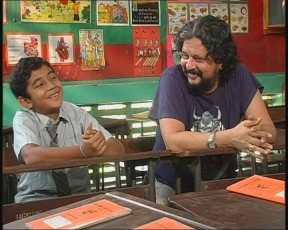 Not for him any kind of creative mafia that requires art to be packaged, trumpeted and sold. So he was briefly an artist-in-residence at FTII along with Saeed Mirza. And subsequently took his art to kids and began working with them. That is why it took him so long to make a film perhaps. Because if Amole Gupte can be called anything, it is this. He is a man who will “never stand in the line.” To sell his soul. His craft. His point-of-view. “Thank God, I never had focus,” he says and adds,”I hope I never find it because to me making a cup of tea is as fulfilling as making a film.” And yet here he is. A tree that “has been growing quietly.”
Not for him any kind of creative mafia that requires art to be packaged, trumpeted and sold. So he was briefly an artist-in-residence at FTII along with Saeed Mirza. And subsequently took his art to kids and began working with them. That is why it took him so long to make a film perhaps. Because if Amole Gupte can be called anything, it is this. He is a man who will “never stand in the line.” To sell his soul. His craft. His point-of-view. “Thank God, I never had focus,” he says and adds,”I hope I never find it because to me making a cup of tea is as fulfilling as making a film.” And yet here he is. A tree that “has been growing quietly.”
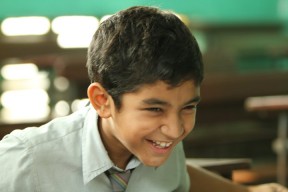 Cinema too is not a vehicle for fame or money because he can do without both. “My wife (editor and film maker Deepa Bhatia) and son (Partho who makes his acting debut in Stanley Ka Dabba) live in a one room home. We talk and listen and argue and share every thought.” And that along with two square meals is enough.
Cinema too is not a vehicle for fame or money because he can do without both. “My wife (editor and film maker Deepa Bhatia) and son (Partho who makes his acting debut in Stanley Ka Dabba) live in a one room home. We talk and listen and argue and share every thought.” And that along with two square meals is enough.
Cinema too, he says, is just a, “Bhompu, a loud-speaker to talk about serious anguishes most adults overlook especially when the writing is on a child’s wall. They don’t have the patience to read so they jump over the wall.”
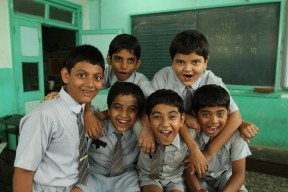 So if TZP was about dyslexia and the isolation it traps a child in, Stanley Ka Dabba is about the millions of Stanleys who go hungry everyday in India and are made to work as child labourers and abused with violence and neglect. And no this activism for children does not come from an adult perspective but from the fact that, “I have never grown up. My wife says often, “Yeh bada kab hoga!” And he traces back his connection with kids to his childhood, “We lived in one of the 188 flats in a LIC Society. I was one of the 400-500 kids and we had grounds to play in, trees, basket ball courts. We played gilli danda and shared everything. And I am still a child though I am 50.”
So if TZP was about dyslexia and the isolation it traps a child in, Stanley Ka Dabba is about the millions of Stanleys who go hungry everyday in India and are made to work as child labourers and abused with violence and neglect. And no this activism for children does not come from an adult perspective but from the fact that, “I have never grown up. My wife says often, “Yeh bada kab hoga!” And he traces back his connection with kids to his childhood, “We lived in one of the 188 flats in a LIC Society. I was one of the 400-500 kids and we had grounds to play in, trees, basket ball courts. We played gilli danda and shared everything. And I am still a child though I am 50.”
And as serendipity would have it, the housing complex was just next to Natraj Studio! “So when we got tired of playing, we could hop over to see Dharmendra, Amitabh Bachchan and others!” he recalls. A perfect brew, this childhood, to fuel and inspire the filmmaker he is today. A craftsman with a sense of cinema who can also go down on his knees before a child and humble himself to learn something new each day.
“I am not doing children any favour by making films about them. They are the face of God.They are unpolluted teachers and if we have any sense, we will learn that they have more to give us than we can ever give them. What you give to a child, he returns ten-fold. Partho teaches me so much everyday. He has been a part of workshops with children from disadvantaged backgrounds and with disabilities from the time he was three and so in Stanley Ka Dabba, it was he who guided me with his performance rather than the other way around,” he says.
So if life is not an ambition or a agenda, what exactly is it? He says, “Everything to me is about satiation, creation and a certain sensibility. I am from a middle-class family and as a child, my father took me to hear Bhimsen Joshi and Sawai Gandharva, to watch theatre. That was his idea of enriching me. So when those influences in some way began to define the paths I took, it was enough for my parents. They never panicked about me. To them, I was already a success because in their eyes, I was a path breaker. I think of myself as a muflis raaste ka, but they don’t.”
About Deepa, his wife, soul-mate and partner in breaking paths, he says,”Without Deepa, there is no Amol. With her there is a sense of completion in body, mind and soul.” And as for Stanley Ka Dabba, the story does not end with the film. It begins when the film ends and we walk out with the knowledge that we cannot ignore children in distress anymore ( To know how you can help, please go to www.stanleykadabba.com)
And what’s next? He says, “There are more stories to tell.” And thank God, we have now an Amole Gupte to tell them to us.
Reema Moudgil is the author of Perfect Eight. (http://www.flipkart.com/perfect-eight-reema-moudgil-book-9380032870) . More on Story Wallahs. Other books by Unboxed Writers in our Store






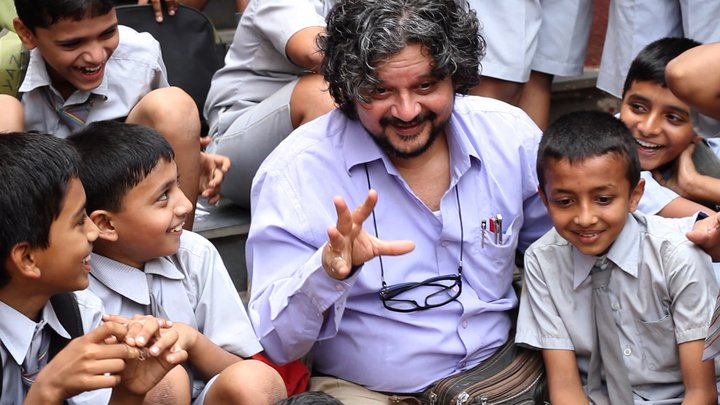
What a fantastic interview with a fantastic person! Love it!
Very engaging. If I wasn’t sure whether I would see the film, now I know I will.
So beautiful!! 🙂